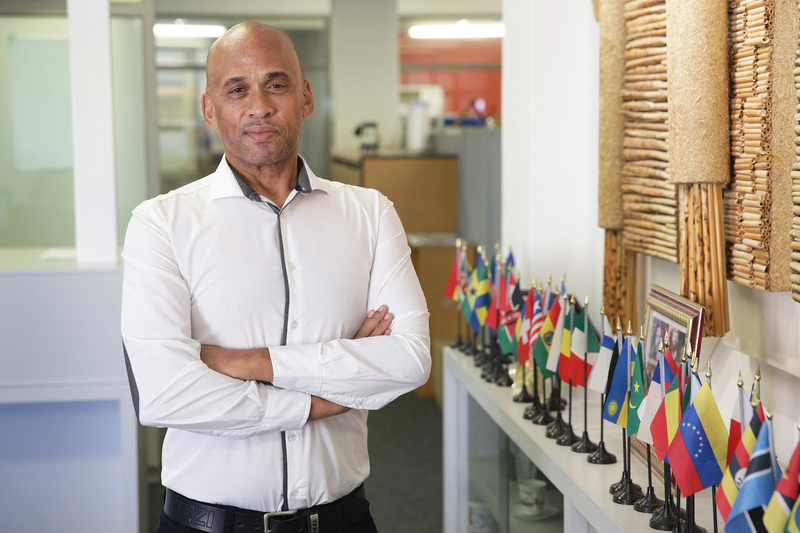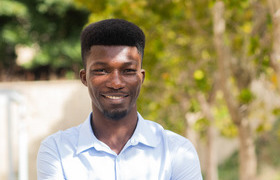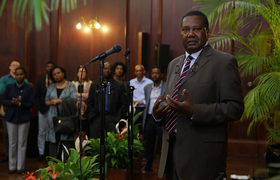‘We have to switch that light on ourselves’
15 February 2019 | Story Helen Swingler. Photo Michael Hammond. Read time 6 min.
In the open-plan section of the University of Cape Townʼs (UCT) International Academic Programmes Office (IAPO), finance officer Leon Petersen is attracting attention. A UCT News photographer is clicking away, paparazzi style, directing him. Stand like this. Sit like that.
Petersen has been lauded for great customer service to the university’s international students during the January pre-registration when the IAPO team saw close to 2 500 students in two weeks. (“It’s an onslaught,” he said.)
Now he’s about to be interviewed about the “gees” that revs him up – and infects his teammates. And they have come to share in it.
“Guys, Leon is doing a photo shoot,” someone announced. More heads pop up behind screens. “OMG! I want to walk with Leon!”
“IAPO golden boy!” quipped another.
“Work it baby, work it!” said a third as the photographer cajoles Petersen-the-golden-boy into just one more shot.
“Has Leon won the Powerball?” asked a fourth, hopefully.
Petersen is all smiles.
Face of IAPO, UCT
This is the face UCT’s new international students meet when they arrive for IAPO pre-registration at UCT’s vast Sports Centre.
“One of the things that keeps me going through this intense pre-registration period is seeing long queues of students and thinking that it could easily be my own children [alone in a foreign country].”
It’s an exhausting sequence of administrative checks and balances: visas and immigration papers, money and fee matters, health and health insurance.
For the Zimbabwean students, that smiling face is also a listener, a carer; someone who understands how hard it is getting money out of their country right now. Petersen helps them make sense of PoPs, TTs and other finance-speak.
That smile also calms the refugee student who is unsure of her upfront fee payment and asylum status. And the newbie student who arrives with his elderly parents. They’ve walked from pillar to post between middle and upper campus in heat that melts your soles.
Petersen sits the parents down, cold water is brought, and then he personally escorts their son to upper campus to clear up the misunderstanding with his faculty. Afterwards he arranges a lift for them to meet their son there.
That’s service.
And for Petersen, it’s all in his day’s work.
Energy and empathy
Students energise him, he said. His store of empathy stems from being a father himself; there’s Leon junior, who temps at The Baxter, and Tayla, a UCT social sciences student.
“One of the things that keeps me going through this intense pre-registration period is seeing long queues of students and thinking that it could easily be my own children [alone in a foreign country] … and that makes me continue and provide my best service.”
Caring is his way of playing out his spirituality in the world. And it starts with listening.
“I listen actively to each one. I give them the same support.”
Petersen calls it “being the brand”, the human contact beyond a phone, a screen or a form.
“I want to be part of that human contact. Our whole [IAPO] team is like that.”
With that team camaraderie, it’s easy to be enthused about good service.
“Well, how would you like to be treated?” he asked. [Mental note to make colleagues tea.]
“I’m part of a team and that’s so important. It’s a collective and you’re only as good as your team.”
“We have to switch that light on ourselves. That way they are going to feel that energy.”
Flick the switch
His day begins early. He’s at his desk by 07:00. By then he’s enjoyed a run, essential for keeping trim and part of his self-care regime.
“It’s up to us to make it a happy place,” he said of IAPO and the work they do.
“We have to switch that light on ourselves. That way they are going to feel that energy.”
And clearly they do: It’s not rare for parents or students to visit for a chat or to express gratitude. Thanks to UCT’s largish contingent of students from East Africa, he’s now a firm fan of Kenyan tea.
Dealing with international students also keeps him grounded. The xenophobic stance of some of the country’s student leaders towards “foreigner students” saddens him.
“We’re all global citizens, members of a dynamic, cross-cultural society. There’s a symbiotic relationship with international students in culture and thinking. We [UCT] receive something from these exchanges, too.”
Real networking
An anecdote underscores this. During last month’s pre-registration Petersen started a conversation with a student from the Seychelles. Talk turned to the threat to the islands of rising sea levels.
“Yes, that’s why my country sent me here; to learn to be a good engineer,” the student said.
It wasn’t long before conversation ignited in the queue of young students, eager to learn about each other’s countries and talk about a common threat: global warming.
That’s networking, said Petersen.
“We can’t be inward looking in this confined space. They bring their own experiences and perspectives – on Trump, Brexit...”
“We can’t be inward looking in this confined space. They bring their own experiences and perspectives – on Trump, Brexit… Being at university is not only about researching and reading, especially among undergraduates.”
UCT also participates in student exchange and enrolment programmes abroad, he said, our students travelling to experience and learn at other universities.
There they are the strangers, the newbies in need of a Leon Petersen welcome.
 This work is licensed under a Creative Commons Attribution-NoDerivatives 4.0 International License.
This work is licensed under a Creative Commons Attribution-NoDerivatives 4.0 International License.
Please view the republishing articles page for more information.










